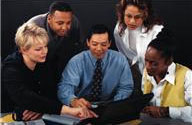Living Whole
There is only one way to truly create change, to grow, to participate in transformation–both in your own life and in that of others–and that is wholistically. Thinking wholistically means considering healing from a systems approach, from the big picture, from the WHOLE. (I know the word is usually spelled “holistic”, but I prefer the less common spelling, which gives reference to “wholeness”!)
Well, I suppose there are other ways to look at healing. You could look at it from a narrow focus on one of the parts, one of the participants, one of the symptoms. You could ignore the whole person or whole system, and simply attempt to fix one aspect. But what happens when we are in denial about the relatedness of the parts? Usually the “fixing” doesn’t last. We fall back into old patterns, backslide, relapse.
The principle of wholism applies to any and every aspect of our lives and our society. It applies to psychology, to medicine, to gardening, to having a family, to shopping, to managing a corporation, to knitting a sweater, and to healing a planet.
When we perceive and interact with our worlds in a wholistic manner, we facilitate competence, efficiency, balance, and completeness. We see the forest and the trees.
The wisdom of a wholistic approach applies to any arena. In my field of psychology, I keep an awareness of all aspects of a client–body, mind, emotions, and spirit, considering that person’s entire operating system, not just one part, and I make referrals to other professionals when appropriate. For example, if someone comes in with depression, I not only counsel regarding the issues, but I also check to see if perhaps there might be a Vitamin B deficiency, or if there are other physical reasons for the depression. If a person is anxious, I ask about some of the more obvious physical causes, such as sugar and coffee intake, as well as about the lighting in their office and other dietary and environmental factors–not just psychological factors. With people who are addicted to drugs or alcohol, I don’t only address the behavior of quitting. I also address the self-esteem and family issues that set the addictions in motion long ago. If I am working with a young person, I see the parents as well, or, if possible, the entire family.
On a corporate level, we are now seeing organizations beginning to operate wholistically in offering wellness and prevention programs to their employees. It is finally being recognized that when individuals are taught how to care for themselves properly and supported in living healthy lifestyles, billions of dollars in healthcare can be eliminated. When employees’ personal needs are addressed, when they are thought of less as “human resources” and more as valued partners in a business, they are happier and more satisfied. As much as we tend to think that personal concerns are not brought to the work place, the fact is, they are omnipresent in the minds and bodies of every person in every job. When I do corporate consulting, I help companies address the needs of the individuals within a business. This is always a win-win approach that is both wholistic and financially beneficial to all concerned..
Medicine, too, is moving in a more wholistic direction. For example, since many illnesses are stress related, teaching relaxation and stress management techniques is now an important aspect of many wellness programs. It is not unusual for cancer patients now to be referred to counselors to help them understand how their negative thoughts about themselves might be to be “eating away” at them. The whole world of AIDS healing has illuminated how dramatically emotions affect the immune system. And recognition of the spiritual component in healing has finally begun to find its place both in the research and the medical facilities of this nation.
Body, Mind, Emotions, Spirit–we are multifaceted beings, and without addressing all the elements involved in our growth and healing, that healing cannot occur. Some time ago I was lucky enough to share the last few days of my father’s life with him before he died of congestive heart failure. The doctor’s did their best, but by the time they did a quadruple bypass, he had already been eating meat three times a day and drinking too much alcohol for many, many years. I heard my mother say, “If only we had….” as she thought of one after another thing that might have been done to help him in those final weeks and months.
But, in fact, my father had always struggled with low self-esteem, despite his many accomplishments; his beliefs, his mental constructs about himself did not allow him peace of mind. He had always struggled with anger and hurt, despite his basically loving nature; his emotions constantly left him struggling within himself. The excesses of his diet were only manifestations of the mental and emotional challenges he faced: The excessive fat assuaged the anger; the excessive meat protein gave him a sense of power and strength; and the alcohol killed the hurt, at least temporarily. And always, he struggled with an aloneness in the universe–he lacked an awareness of that spiritual component that could have helped him heal all of the parts.
As I comforted my mother and reassured her that she had done her best, and that all was well within a wholistic universe, I, too, became more aware of the wholeness of the situation. Not only was there really nothing we could have done at this point in his life–for the mental and emotional factors had been addressed too late–but that it was all okay anyhow. Sometimes when we are not thinking wholistically, we forget that death, too has it’s own best timing. We struggle to make sure someone stays alive regardless of whether this is in their best interest. A wholistic view knows there is a right time for everything—a time to be born, a time to die….
My father had done his best, and he had grown as a human being a great deal in his last few years. He HAD addressed some of those emotional issues, becoming softer and kinder. He HAD cut back on the alcohol and become better at eating vegetables. But he was tired and ready to go Home. From a wholistic perspective, his life had become whole, complete. It was too late to save the physical body after years of abuse, but seventy-four is not a bad time to go, and in the last few years, his soul–his spiritual component–had evolved enormously. Even in death, he had succeeded in bringing all of the parts together. I was proud of him.
My father’s life reflected his era, but today we live in unusual and exciting times which allow the kind of growth, expansion, self-examination, and wholistic healing that was unknown to our forefathers. We have the opportunity, and also the responsibility, to address the whole in our homes, in our schools, in our places of healing, in our nation and in our world. How and where does this fit for you? Learn more about wholism; discover ways in which you can keep the big picture in mind; discover how all of the components of your world–family, business, body, etc.,–can work together for the greater good.











